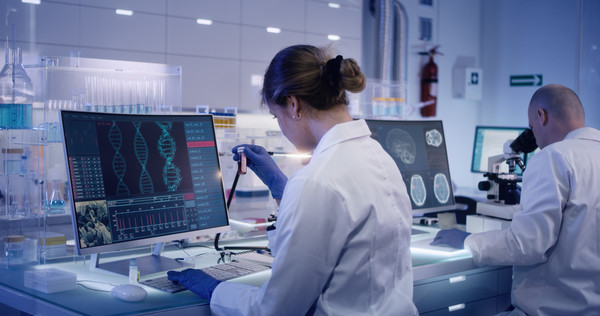The global recognition of Korea’s bio-health industry and related products increased significantly in the wake of the Covid-19 pandemic, a survey showed.
The Korea Health Industry Development Institute (KHIDI) released the results of the 2021 international survey on the brand recognition of Korean bio-health products. The poll was on 6,240 general consumers and 235 medical professionals in 19 cities in 15 countries from Nov. 10-30, 2021.

Respondents reported their answers through online panels to questions on their awareness of Korean bio-health products, Korean goods’ (drugs, medical devices, cosmetics) quality, price, intention to buy, satisfaction, favorability, and competitiveness. The confidence level was 95 percent, with a ±1.24 percent margin of error.
The results showed that 66 percent of the respondents were familiar with Korean bio-health products, up from 41.2 percent in the previous survey conducted before Covid-19. The heightened recognition occurred in all areas of drugs, medical devices, and cosmetics.
In terms of brand awareness of Korean companies, 62.9 percent of overseas consumers said they were familiar with the overall Korean bio-health sector, up 23.8 percentage points from the pre-pandemic time.
In medicines, Samsung Biologics had the highest brand recognition (77.1 percent), followed by Hanmi Pharmaceutical (41.3 percent), Celltrion (33.5 percent), and Chong Kun Dang (31.9 percent).
Samsung Medison ranked first in medical devices with 87.7 percent, followed by Seegene (35.6 percent) and Osstem Implant (28.4 percent).
By country, nine out of 10 people in Vietnam, Thailand, and Indonesia perceived Korea as a manufacturer of bio-health products after the pandemic.
The perception rate was highest in India, the UAE, and Germany, which imported a significant amount of Korean Covid-19 test kits.
The respondents gained access to information about Korean bio-health products through doctors and nurses the most and through families, acquaintances, portal sites, and online videos.
Such information was spread via experts in countries like Brazil, Kazakhstan, and India. Portal sites were most influential in Thailand, France, and India. The word of mouth effect was most effective in Vietnam, Russia, and Thailand.
In contrast, traditional media such as TV and magazines did not have much effect on delivering information about Korean bio-health products.
Asked which country is leading the global bio-health sector, the respondents said Korea ranked sixth among 13 countries in medicines and medical devices and fifth among 13 countries in medical services.
Those in Asian countries, compared to others, perceived Korea as a leading country in the global bio-health business.
According to the KHIDI’s analysis, Brazilians, Indonesians, and Australians who have used a Korean bio-health product described Korean products as “safe and reliable.” In addition, people in India, the UAE, China, and German had a “clean and nature-friendly” image of Korea.
Consumers in Kazakhstan, Brazil, and Russia thought Korean bio-health products were excellent compared to the price, and those in Indonesia, Australia, and Germany thought Korean products had advanced technology.
When choosing Korean bio-health products, international consumers gave top priority to the brand (manufacturer) (28 percent), followed by country of the brand (11.5 percent), price (11.2 percent), and side effects (6.9 percent).
About 54 percent of the respondents said recommendations by doctors or pharmacists affected their decision to buy Korean medicines, and 43.9 percent, Korean medical devices.
By country, the influence of experts was strong in Brazil and India, and the impact of product reviews on social media such as YouTube was high in Germany and Japan.
The KHIDI also polled their satisfaction with Korean drugs and medical devices.
While consumers in the U.S., India, China, and Kazakhstan had high anticipation and satisfaction, those in Brazil, Germany, Australia, and Japan had low anticipation but high satisfaction after using Korean products.
In medical devices, Indonesians, Indians, the British, Australians, and Russians had high expectations for Korean goods and high satisfaction.
However, people in France, Japan, the U.S., Germany, the UAE, and China had low expectations and satisfaction.
One Brazilian respondent in the pharmaceutical industry said Brazil’s access to Korean medical devices was too low compared to traditionally well-established German and American products.
Only a few hospitals and medical device importers are aware of Korean medical devices, and Korea’s market share was too low to make Brazilians purchase Korean items, the industry official said.
However, as Korean technology has a good reputation in Brazil, he added that Korean companies would need long-term investment.
The KHIDI noted that bio-health products, including quarantine and essential medical supplies, have become important due to the spread of Covid-19.
“Although Korean bio-health products proved their potential through the expansion of production and exports, companies should judge the value of the bio-health industry in overseas markets and establish a strategy customized for each country to make their growth sustainable,” the KHIDI said.
The most important task is to objectively identify the status of the Korean bio-health industry and gauge the international perception of Korean products, it added.

